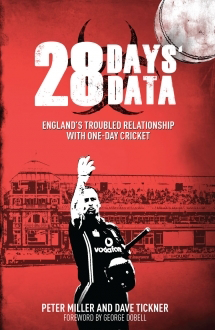 |
||
| ABOUT ME | SOME INTERESTING CRICKET FACTS | BOOK REVIEWS | EVENTS | CONTACTS | ||
 |
28 Days' Data by Peter Miller and Dave Tickner Published by Pitch Publishing Ltd. A2 Yeoman Gate, Yeoman Way, Worthing, Sussex BN13 3QZ Web: pitchpublishing.co.uk Paperback 352 Pages RRP: Sterling Pounds 9.99 ISBN 978 178531 1505 |
|
England's history with one-day cricket is a troubled one. Despite inventing the limited-overs game more than 50 years ago, they have never won the World Cup. Peter Miller & Dave Tickner's excellent book, namely, 28 Days' Data attempts to understand why England went from almost winning the 1992 World Cup to consistent underachievers for the next two decades. I found many interesting topics in the book, divided into eleven chapters - commencing from Prologue to the Epilogue - Redemption (almost). In fact, they have made at least the semi-finals five times - 1975, 1979, 1983, 1987 and 1992 but never won the World Cup, losing thrice - 1979, 1987 and 1992. The writers spoke to as many of those who played for or coached England as possible. For them, it was difficult to speak to those who are still within the England set-up. With interviews from England captains, players and coaches, this is the definitive take on England's failed attempts to be world beaters in the shortest forms of the game - and whether things might finally be about to change. According to the authors, the cricket that England played at the 2003 World Cup was patchy, the results for the most part poor, but Hussain emerged from it with a huge amount of credit. And he will never ever stop thinking about losing that game to Andy Bichel. In his Foreword, George Dobell, senior correspondent, ESPN Cricinfo has remarked: "This book should probably come with a health warning. It will bring back memories of long-buried traumas. There's the Wasim Akram spell in 1992, Andy Bichel beating England all on his own in 2003, Kevin O'Brien producing an innings so incredible he should probably have worn a cape (2011), the day-night loss in Wellington that was completed before there was any need to turn on the lights (2015) and, may be grimmest of all, the 1999 elimination that occurred before the event's theme song was released. A theme song whose video suggested that only the insane attended cricket." Former England captain, now director of cricket, Andrew Strauss offers his vision for a brighter white-ball future. Summing up, the writers believe a World T20 victory have been the Hollywood ending to a year of limited-overs discovery for England, but the point had been proven. Giving the white ball the focus it deserves produced brilliant cricket that helped England win cricket matches. Maybe the message has got through. Maybe they have finally realised that it doesn't have to be Test cricket or one-day cricket. Maybe this is the start of something truly special for England in the limited-overs formats. Attractively laid-out and logically organised, the book is a superb production indeed. The Pitch Publishing finished product is again exemplary.
|
||
Home | About | Cricket Facts | Book Reviews | Events | Contacts | Sitemap | Disclaimer
© Rajesh Kumar 2010 all right reserved